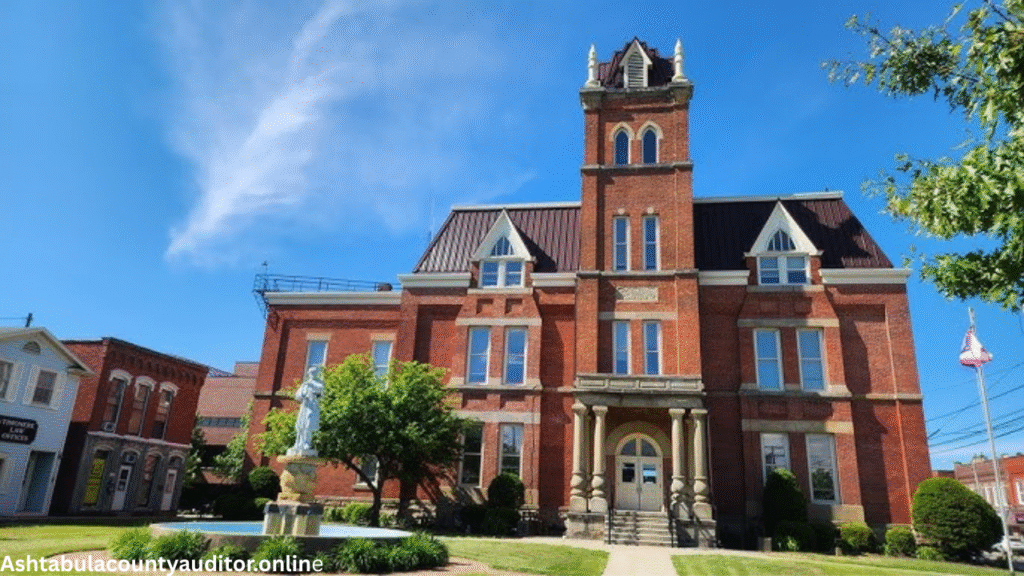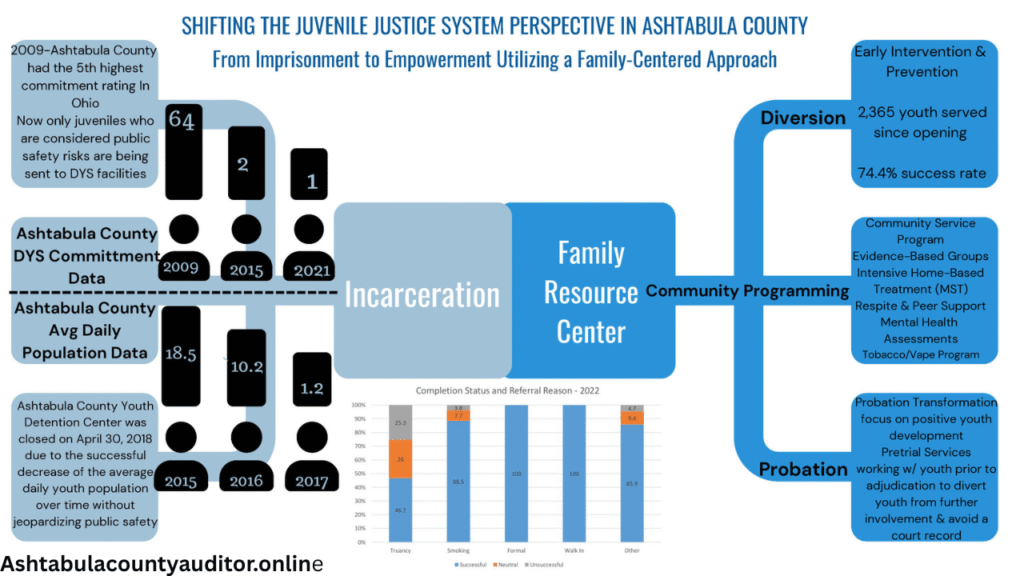The Ashtabula County Probate Court is a specialized branch of the judiciary in Ohio. It oversees matters involving estates, guardianships, adoptions, trusts, and vital records. Residents rely on this court for legal processes such as marriage licenses and estate settlements. With a focus on community service, the court ensures fairness, transparency, and accessibility. Understanding its structure, duties, and history helps the public navigate important life events with confidence.

About the Court
The Probate Court operates as part of the Court of Common Pleas in Ashtabula County. It is dedicated to handling probate cases and related family matters. The court staff, judge, and magistrate collaborate to deliver justice efficiently. Key responsibilities include estate administration, guardianships, and mental health proceedings. By offering guidance and support, the court serves as an essential resource for individuals seeking legal resolutions within the county.
Probate Court Mission Statement
The mission of the Ashtabula County Probate Court is to serve the public with integrity and fairness. It aims to provide efficient access to justice while protecting the rights of all individuals. By handling sensitive family and estate issues with professionalism, the court fosters trust within the community. Its goal is to ensure every citizen receives equal treatment under the law in probate and guardianship matters.
History of the Probate Court
The concept of probate courts originated from English ecclesiastical courts that managed wills and estates. In Ohio, probate courts were established as independent divisions to handle such legal matters. Ashtabula County’s Probate Court has a long history of guiding families through estate settlements and guardianship processes. Over time, the court has expanded its jurisdiction to include adoptions, name changes, and marriage licenses, reflecting its evolving role in community life.
Jurisdiction & Functions of the Court
The Ashtabula County Probate Court exercises authority granted under the Ohio Revised Code. Its jurisdiction covers estate administration, guardianships, trusts, mental health commitments, adoptions, and marriage licenses. The court also oversees birth corrections, delayed registrations, and name changes. By managing these areas, the court safeguards personal rights and ensures compliance with legal requirements. Each function demonstrates the court’s vital role in preserving order and justice for local residents.

Key Functions of the Probate Court
The court fulfills numerous responsibilities crucial to residents:
- Estates: Supervises distribution of assets after death.
- Guardianships: Protects minors and incapacitated adults.
- Adoptions: Legalizes new family relationships.
- Trusts: Ensures management of trust funds.
- Marriage Licenses: Issues licenses with legal guidance.
- Mental Health: Handles involuntary commitments.
- Vital Records: Corrects birth and death records.
- Name Changes: Authorizes legal identity changes. These functions highlight the broad scope of services managed by the Probate Court.
Administration of Estates
One of the primary duties is overseeing estates after someone passes away. Executors or administrators file documents to manage debts and distribute assets. The court ensures beneficiaries receive their rightful inheritance fairly. In Ashtabula County, most estates close within about nine months. By streamlining estate processes, the Probate Court helps families settle financial matters efficiently, while also maintaining accountability and protecting legal rights throughout the procedure.
Magistrate – Richard Dana Esq.
Magistrate Richard Dana, Esq. serves the Ashtabula County Probate Court with distinction. He assists the presiding judge in reviewing cases, issuing recommendations, and conducting hearings. His role ensures that cases are managed promptly while maintaining fairness. With expertise in probate law, Richard Dana provides valuable support in estate administration, guardianships, and adoptions. His presence strengthens the court’s ability to address sensitive matters with knowledge and professionalism.
Probate Staff
The court operates with dedicated staff members who assist in daily procedures. Deputy clerks handle filings, process documents, and guide residents through requirements. The Chief Deputy Clerk oversees records and ensures administrative accuracy. This support system keeps the Probate Court accessible to the community. Staff members play a vital role by helping families understand forms, fees, and deadlines, ensuring smooth court operations and timely access to justice.
Court Administrator
The Court Administrator manages the operational side of the Probate Court. Responsibilities include overseeing staff, coordinating schedules, and ensuring compliance with policies. By maintaining efficiency, the administrator helps the court deliver fair and timely services. The administrator also serves as a liaison between the public and judicial officers. This role is critical in providing seamless communication, reducing delays, and ensuring the Probate Court functions effectively within Ashtabula County.
Chief Deputy Clerk
The Chief Deputy Clerk supervises the clerical team and ensures accuracy in recordkeeping. This position involves monitoring case files, processing legal forms, and managing public inquiries. By supporting judges and magistrates, the Chief Deputy Clerk strengthens court efficiency. Their role also includes ensuring compliance with legal procedures. Residents often rely on this office for accurate information, making it an essential link between the Probate Court and the local community.
Marriage Licenses & Vital Records
The Ashtabula County Probate Court issues marriage licenses to eligible couples. Applicants must meet residency and identification requirements. Licenses are valid for sixty days and come with a modest fee. In addition to marriage licenses, the court handles vital records such as delayed birth registrations and corrections. These services support legal recognition of important life events, ensuring residents have accurate documentation for personal, legal, and government purposes.
Monthly Newsletter
The Probate Court publishes a monthly newsletter covering updates, legal news, and administrative notices. This resource keeps the community informed about changes in probate and juvenile law. It may include staff updates, procedural improvements, and educational articles. By sharing information, the newsletter encourages transparency and accessibility. Residents and professionals can stay engaged with the court’s ongoing work, ensuring they remain aware of developments that may affect their legal rights.
Challenges & Statistics
The Probate Court manages a high caseload each year. Approximately 750 estate cases and 65 guardianships are processed annually. Around 650 marriage licenses are issued, highlighting the court’s active role in family matters. Managing this workload requires careful organization and dedication from staff. Despite resource challenges, the court continues to maintain fairness and efficiency. These statistics reflect the significant impact the Probate Court has on community life.
How to Access Services & Records
Residents can access Probate Court services at 25 W. Jefferson Street in Jefferson, Ohio. Office hours typically follow standard business schedules. The court provides forms online, making processes more convenient. Public records, including estates and guardianships, are also available for review. Contacting the court by phone or visiting its website ensures up-to-date information. With these accessible services, the Probate Court remains a trusted resource for county residents.

Conclusion
The Ashtabula County Probate Court plays a central role in community life by managing estates, guardianships, adoptions, and vital records. Its staff, magistrate, and judge work diligently to ensure justice and fairness. Through its mission of service, the court protects rights and offers guidance during life’s most significant moments. Residents can trust the Probate Court as a reliable partner for resolving legal matters with integrity and transparency.
Frequently Asked Questions (FAQs)
What is the Ashtabula County Probate Court responsible for?
The court oversees estates, guardianships, adoptions, trusts, marriage licenses, name changes, and certain mental health matters.
Where is the Probate Court located?
The Ashtabula County Probate Court is located at 25 W. Jefferson Street, Jefferson, Ohio.
How do I apply for a marriage license in Ashtabula County?
Couples must apply in person at the Probate Court, provide valid identification, and pay the required fee. Licenses are valid for sixty days.
How long does it take to settle an estate?
Most estate cases in Ashtabula County close within about nine months, though complex cases may take longer.
Can the Probate Court help with adoption?
Yes, the court has jurisdiction over adoptions and ensures the process meets Ohio state requirements.
Who is Magistrate Richard Dana, Esq.?
He serves as the magistrate for the Probate Court, assisting the judge by conducting hearings and issuing recommendations.
Does the court handle guardianship cases?
Yes, the court oversees guardianships for minors and adults who are unable to manage their personal or financial affairs.
Can I request a name change through the Probate Court?
Yes, the court processes petitions for legal name changes, provided all requirements are met.
How do I access probate records?
Probate records can be accessed at the court’s office or online through the official website’s record request system.
Where can I find forms for probate cases?
All necessary forms are available at the court office or for download on the official Ashtabula County Probate Court website.

